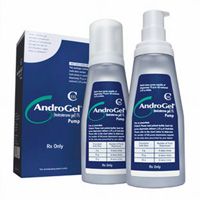 The Federal Trade Commission won't let go of its pay-for-delay suit against AbbVie ($ABBV). The U.S. agency urged a Pennsylvania federal court to move forward with its lawsuit alleging that an AndroGel patent settlement violates antitrust law.
The Federal Trade Commission won't let go of its pay-for-delay suit against AbbVie ($ABBV). The U.S. agency urged a Pennsylvania federal court to move forward with its lawsuit alleging that an AndroGel patent settlement violates antitrust law.
AbbVie argues that it did not delay a generic version of its drug and contends that the suit fails to meet a precedent set last year by the U.S. Supreme Court.
In September, the FTC sued Abbott Laboratories ($ABT) and Teva Pharmaceutical Industries ($TEVA) for allegedly striking a deal to keep an AndroGel copycat off the market. The agency alleges that Abbott--which later spun off its pharma business as AbbVie--and a partner, Besins Healthcare, filed baseless patent infringement suits against potential generic competitors to fend off a generic AndroGel product. The companies then struck a side deal with Teva while the suits were pending, the FTC suit claims. AbbVie allowed Teva to sell an authorized generic of its cholesterol blockbuster TriCor, and in return, Teva delayed its AndroGel copies, the suit says.
The FTC argues that the authorized generic deal "made no independent business sense for AbbVie" and "forced consumers to overpay hundreds of millions for the drug AndroGel," the agency said at the time.
Regulators' latest courtroom push follows a landmark pay-for-delay case, as last year the nation's high court ruled in a 5-3 vote that the FTC had the right to challenge brand-name drugmakers' patent settlements with generics companies. The ruling dealt a blow to the drug industry, but stopped short of adopting the FTC's position that patent settlements should be assumed anticompetitive unless proven otherwise.
Since the Supreme Court ruling, the FTC has stepped up its pay-for-delay fight, with drugmakers such as AstraZeneca ($AZN), Ranbaxy and Endo Pharma ($ENDP) coming under regulatory scrutiny. In March, the agency said it hoped to reach a $1 billion settlement in at least one pharma antitrust case in 2014, as it cracks down on companies that pay generics makers to hold off on copycat products.
Meanwhile, AbbVie continues to deal with pushback related to its AndroGel product on other fronts. In September, an FDA advisory panel voted 14-1 to restrict testosterone-replacement therapies to men with a related medical condition, a shot of bad news for AbbVie, the market leader for low-T drugs. AbbVie also faces a growing pile of AndroGel liability cases, which accuse the company of spending $80 million to promote the idea that low-T supplements can fight typical signs of aging.
The company enjoyed a bright point in September, when a judge tossed out claims that AbbVie and Abbott conspired with pharmacies to boost sales of AndroGel and its autoimmune blockbuster Humira. Plaintiffs argued that AbbVie told pharmacies to hide "subsidies," or copay offers, by processing them as secondary insurance claims rather than discounts paid for by the drugmaker, but U.S. District Judge Robert Dow did not find evidence of any fraudulent activity.
- here's the FTC's brief (PDF)
Special Report: Top 10 pharma companies by 2013 revenue